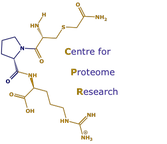Designing QconCATs for a mammalian pathway
Simpson, D.M. & Beynon, R.J. (2012) QconCATs: design and expression of concatenated protein standards for multiplexed protein quantification. Analytical and Bioanalytical Chemistry (in press)
Systems biology requires knowledge of the absolute amounts of proteins in order to model biological processes and simulate the effects of changes in specific model parameters. QconCATs are established as a methodology to provide multiplexed absolute peptide standards for a set of target proteins in isotope dilution standard experiments. Two or more quantotypic peptides representing each of the target proteins are concatenated into a designer gene that is metabolically labelled with stable isotopes in E.coli or other cellular or cell-free systems. Co-digestion of a known amount of QconCAT with the target proteins generates a set of labelled reference peptide standards to the unlabelled analyte counterparts and by using an appropriate MS platform comparison of the intensities of the peptide ratios delivers absolute quantification of the encoded peptides and in turn the target proteins for which they are surrogates. In this review we discuss the criteria and difficulties associated with surrogate peptide selection and provide examples in the design of QconCATs for quantification of the proteins of the NF-κB pathway.
Systems biology requires knowledge of the absolute amounts of proteins in order to model biological processes and simulate the effects of changes in specific model parameters. QconCATs are established as a methodology to provide multiplexed absolute peptide standards for a set of target proteins in isotope dilution standard experiments. Two or more quantotypic peptides representing each of the target proteins are concatenated into a designer gene that is metabolically labelled with stable isotopes in E.coli or other cellular or cell-free systems. Co-digestion of a known amount of QconCAT with the target proteins generates a set of labelled reference peptide standards to the unlabelled analyte counterparts and by using an appropriate MS platform comparison of the intensities of the peptide ratios delivers absolute quantification of the encoded peptides and in turn the target proteins for which they are surrogates. In this review we discuss the criteria and difficulties associated with surrogate peptide selection and provide examples in the design of QconCATs for quantification of the proteins of the NF-κB pathway.
